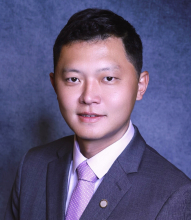CBE 298 Seminar: Micro- and Nanofluidic Systems for Molecular Biosensing, Nanotoxicity, and Optogenetics

Assistant Professor
Chemical and Environmental Engineering
University of California, Riverside
Abstract: Micro- and nanofluidic systems, in conjunction with biochemistry, microscopy, nanomaterials, and machine learning components, serve as potent tools with a wide array of applications in the biomedical field. These applications encompass crucial areas like molecular diagnosis, biophysics, and optogenetics. In this presentation, we shed light on an innovative pneumatic-controlled nano-sieve device. This device is packed with magnetic beads and facilitates the rapid concentration of drug-resistant bacteria from blood samples. Subsequently, an isothermal amplification and CRISPR assay are conducted. This system achieves an on-chip concentration factor of 20x, effectively pushing the bacterial detection threshold to 100 cfu/mL. To make sensing automatic and devoid of the need for specialized instruments, a computer vision program is developed. This program exhibits an approximate accuracy rate of 100% in discerning both positive and negative samples within the microfluidic chip. This attribute renders it particularly suitable for on-site detection in resource-limited environments. Furthermore, we delve into our recent strides in comprehending the interactions between nanomaterials and eukaryotic organisms. This understanding is facilitated by a deformable microfluidic platform, advanced microscopy, and molecular dynamic simulations. Within this context, we explore a range of clinical applications. These applications span from in vivo bioimaging employing optofluidics to addressing dentine hypersensitivity and advancing the realm of synthetic biology.
Bio: Dr. Ke Du is an assistant professor of chemical and environmental engineering at UC-Riverside and leads the Nanobiosensing, Nanomanufacturing, and Nanomaterials (3N) Lab. He received his Ph.D. degree at Stevens Institute of Technology in 2015. Following post-doctoral training at UC-Berkeley with Richard A. Mathies, he started his independent career at the Rochester Institute of Technology in 2018. In 2022, Du’s lab moved back to California and joined UC-Riverside. Du’s research interests include in vitro molecular diagnostics, in vivo bioimaging, nanotoxicity, and nanomanufacturing. He is recipient of numerous awards and honors such as the EIPBN Best Journal Paper Award (2022), the NIH Maximizing Investigators’ Research Award (2021), the Burroughs Wellcome Fund (BWF) Collaborative Travel Grant (2019), the James H. Potter Award for the outstanding Ph.D. students (2014), and the NSF Graduate Student Fellowship (2012). He has been recognized as a global rising star in sensing by ACS Sensors and a finalist for the MINE 2020 Young Scientists Award. Du’s research has been supported by NIGMS, NIAID, NSF, USDA, DOE, BWF, the UNYTE Translational Research Network, and industry partners such as L3Harris, Mammoth Biosciences, Colgate Palmolive, and Biological Mimetics. Additionaly, he serves as an early career editorial advisory member for Biomicrofluidics (AIP Publishing).
Share
Upcoming Events
-
MSE 298 Seminar: Conquering Thermalization
-
CBE Seminar: Creating a New Circular Carbon Economy via Carbon Capture, Utilization and Storage
-
CEE Seminar: Digital Rock Physics: Applications in Fluid Flow and Rock Deformation
-
MSE 298 Seminar: Exploring Light and Life: Nanophotonics and AI for Scalable Molecular Sensing, Sequencing, and Synthesis
-
Homecoming 2025
